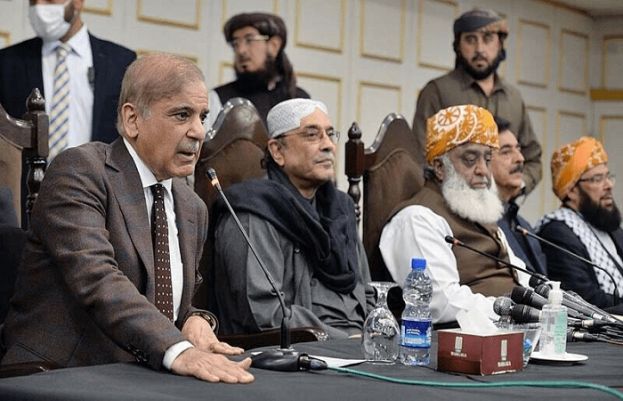The ruling parties — Pakistan Mulsim League-Nawaz (PML-N), Pakistan Peoples Party (PPP), and Jamiat Ulema-e-Islam-Fazl (JUI-F) — Saturday demanded the formation of Supreme Court’s full court bench to hear the suo motu notice taken over the apparent delay in Punjab and Khyber Pakhtunkhwa general elections.
The plea — moved through Farooq H Naek, Kamran Murtaza, and Masoor Usman Awan — also sought the exclusion of Justice Ijazul Ahsan and Justice Sayyed Mazahar Ali Akbar Naqvi.
The development comes a few days after Chief Justice Umar Ata Bandial took a suo motu notice of an apparent delay in the elections of the assemblies, which dissolved in Punjab and KP on January 14 and 18, respectively, and also formed a larger bench to hear the case.
The bench began hearing the case on Thursday afternoon. According to the chief justice’s statement, the bench is to assess who is eligible to issue the date for polls, the constitutional responsibility of the federation and provinces, and who will fulfil the constitutional responsibility of conducting elections and when.
Meanwhile, the ruling coalition — including Prime Minister Shehbaz Sharif — has shared their reservations regarding the two judges in the bench. In a meeting presided by PM Shehbaz, the PML-N noted that it does not expect justice from the two SC judges and that they should recuse themselves from the benches hearing their cases.
The petition — submitted today — mentioned the violation of Article 10A right of the parties involved, while also noting that Justice Jamal Khan Mandokhail stated that referring the matter to the chief justice for taking suo motu under Article 184(3) was inappropriate, who deemed the action “not justified”.
The top court’s judge also raised significant constitutional questions about the way the suo motu powers are to be exercised under the aforementioned article, the petition mentioned.
The petition stated that relevant stakeholders, who received notices from the top court, appeared before the court a day earlier through their counsels and requested the “recusal” of Justice Naqvi and Justice Ahsan via a joint statement from “hearing any matter involving PML (N), PPPP and JUI (Pakistan) and their leadership and in-specific SMC No. 1 of 2023 and CPs No.1 of 2023 and 2 of 2023.”
It added that the circumstances — as recorded in the chief justice’s note — have raised several questions of immense legal, constitutional and public importance.
Therefore, the parties have requested a reconstitution of the bench to hear the titled petitions and have mentioned doing so in the best interest of justice and fairness, and to strengthen the public confidence in the country’s Supreme Court.
Bars demand full court bench
Meanwhile, the Sindh High Court Bar Association (SHCBA) and Khyber Pakhtunkhwa Bar Council (KPBC) have demanded the formation of a full-court bench for hearing the issue regarding polls.
They have also expressed concerns over the exclusion of Senior Puisne Judge Justice Qazi Faez Isa and senior judge, Justice Sardar Tariq Masood, from the nine-member bench.
“This association believes that power of roaster fixation and case should not be rested exclusively with the Chief Justice of Pakistan,” a statement issued by SHCBA read.
Both the bar association and bar council have asked Justice Naqvi and Justice Ahsan to recuse themselves from the bench.
“They should not remain part of the bench for hearing of this important matter,” the Sindh bar’s statement said, while KPBC stated that “serious objections were raised against them from different quarters including the observations made by some of the sitting SC judges”.
The SHBCA also called upon the country’s top judge to “take appropriate steps so that the adverse impression especially in political cases may be redressed”.
On the other hand, the KPBC said that the Supreme Court was giving “protection to undemocratic forces” and even gave the “martial law regime” the right to make amendments to the Constitution.
“That regarding important constitutional cases, the constitution of particular benches for particular cases be avoided to restore the trust and confidence of masses on the courts,” the KP bar council’s statement read.
Election suo motu case: Ruling alliance files plea seeking formation of full court

